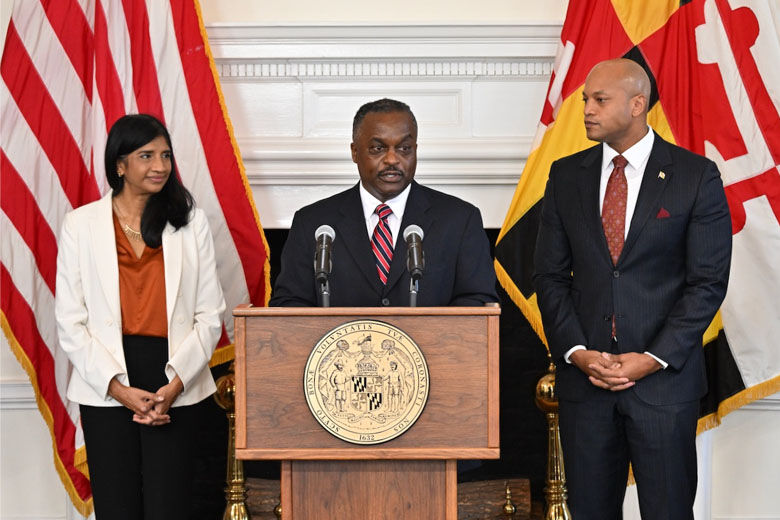Maryland Gov. Wes Moore named a veteran of the Maryland State Police to lead the agency as superintendent.
In a news conference in Annapolis on Thursday, Moore announced that the current acting superintendent, Lt. Col. Roland Butler, is his pick to assume the job on a permanent basis.
Butler has served nearly three decades with the Maryland State Police and was named acting superintendent by then-Gov. Larry Hogan in November. In his most recent role, Butler led the Field Operations Bureau, which oversees the police barracks across the state.
If confirmed by a Senate panel, Butler would be the first African American to lead the Maryland State Police.
He would also be tasked with handling the challenges currently facing the agency, including a federal investigation into hiring practices and allegations that state troopers were urged to issue tickets in a quota system, a story first reported by the Baltimore Banner.

Moore told reporters that Butler is the person he felt “both understood the challenges that existed in the organization, but that also had the core vision and the fortitude to help lead us through it.”
Asked about taking on the top job, Butler told reporters, “I intend to meet all these issues head-on.”
He continued, “Quota systems are unacceptable. However holding people accountable for what they are charged to do — that is perfectly acceptable.”
Butler added, “I will not support quotas. I will not support inappropriate behavior. We’re here to safeguard the communities and the people within Maryland.”
In his announcement, Moore also said he’s concerned about the staffing challenges facing departments across the state and the difficulty of attracting and retaining applicants to serve with the state police.
“We continue to ask too few to do too much” he said. “In previous years, we might have seen a class size as high as reaching 80 or 90 recruits.” Today, said Moore, the average class size is 35, “And the class size that I saw when I visited, is 19,” he said.
In talking about his administration’s approach to crime, Moore emphasized it as a “not an urban problem, not a rural problem, it’s not a Baltimore problem alone — it’s a Maryland problem.”
He pledged to add $11 million dollars to the Maryland Coordination and Analysis Center, which collects, analyzes and shares intelligence information with law enforcement agencies, public health and emergency responder personnel.
Moore also talked up his $122 million dollar investment in state aid for local law enforcement agencies. That includes $5 million “to protect Marylanders against hate crimes.”
Moore said, “Through partnership and intentional investment, we will go after and prosecute the most violent offenders and get them off of our streets.”
While he made clear that fighting crime is a priority of his administration, Moore told reporters, “We cannot and we will not police or militarize our communities out of this problem. Every Marylander must feel safe in their own skin. Every Marylander must feel safe in their own community.”








